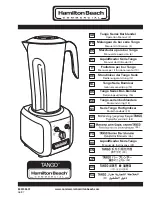
4
4
4
4
FAQs
FAQs
FAQs
FAQs
Does the Model 1068 operate in pairs?
Yes, the Model 1068 must operate in pairs. For each link, a Central Office (1068DV/CO/E) and Customer
Premise (1068DV/CP/E) unit is required. For concentrated applications, the 1068RC and 1068 standalone
can be used to operate with the VDSL Concentrator (Model 3324).
Which end of the link should the “CO” Central Office unit and “CP” Customer Premise unit
be located?
The Model 1068DV/CO/E and 1068DV/CP/E should be located according to their descriptions. The
1068DV/CO/E unit should to be placed at the Central Location and the 1068DV/CP/E should be placed at
the Remote Location due to special filtering requirements for each application.
Does the Patton Model 1068 support VLAN?
The Model 1068 will support VLAN (802.1Q) by passing the larger sized packets transparently. The Model
1068 does not have configuration commands to add a VLAN tag to a packet.
Does the Patton Model 1068 pass higher layer protocol such as TCP/IP packets?
Yes, the Model 1068 does pass higher layer protocols such as TCP/IP. The Model 1068 does not read the
TCP/IP packets, but will pass the packets on transparently.
Is the Model 1068 capable of bridging?
Yes, the Model 1068 will automatically learn, age, and filter 32 source addresses. Destination addresses of
incoming frames are compared with the Source Address in the address table and discarded if an entry
exists; otherwise, they are forwarded over the VDSL link.
Can voice and data be used simultaneously?
Yes, voice and data can be used simultaneously.
Will the POTS/ISDN port on the Model 1068DV operate without power?
The built-in POTS/ISDN Splitter is a passive element and does not require power to operate. The
POTS/ISDN port is able to provide a “life-line” telephone link provided the physical connection between the
CO and CP VDSL modems is still intact.























